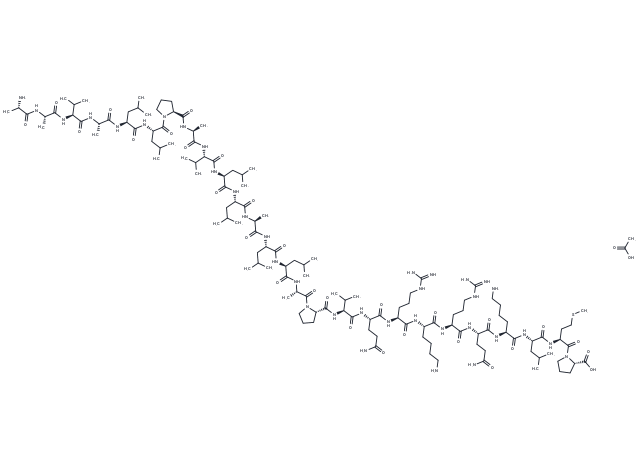Shopping Cart
Remove All Your shopping cart is currently empty
Your shopping cart is currently empty
SN50 acetate is a cell permeable inhibitor of NF-κB translocation.

| Pack Size | Price | USA Warehouse | Global Warehouse | Quantity |
|---|---|---|---|---|
| 1 mg | $48 | In Stock | In Stock | |
| 5 mg | $196 | In Stock | In Stock | |
| 10 mg | $295 | In Stock | In Stock | |
| 25 mg | $472 | In Stock | In Stock | |
| 50 mg | $672 | In Stock | In Stock | |
| 100 mg | $893 | In Stock | In Stock | |
| 200 mg | $1,180 | - | In Stock |
| Description | SN50 acetate is a cell permeable inhibitor of NF-κB translocation. |
| In vitro | Pretreatment with SN50 acetate results in a significant reduction in amount of PI-positive cells at 12, 24, and 48 h time-point post TBI compared with vehicle-treated groups[1]. Topical SN50 acetate suppresses nuclear factor-κB activation in local cells and reduces the incidence of epithelial defects/ulceration in healing corneas. Myofibroblast generation, macrophage invasion, activity of matrix metalloproteinases, basement membrane destruction, and expression of cytokines are all decreased in treated corneas compared with controls[2]. Treating the human gastric cancer cells SGC7901 with SN50 acetate could significantly enhance the effects of LY294002 on inducing cell death after 24 h[3]. SN50 can inhibit translocation of NF-kB and production of inflammatory cytokines that are implicated in lipopolysaccharide (LPS)-induced lung injury[4]. |
| In vivo | Treatment with SN50 acetate accelerates the recovery of motor functional outcome from 1st to 4th day. Animals subjected to SN50 acetate pretreatment demonstrate a significant decrease in the visuospatial learning latencies relative to the control group at 7 and 8 days post-TBI. Pretreatment with SN50 acetate results in a significant reduction of NF-κB p65 protein levels from 6 to 48 h post-TBI and TNF-a protein levels from 12 to 48 h post-TBI[1]. |
| Molecular Weight | 2841.55 |
| Formula | C131H234N36O31S |
| Smiles | O=C(N[C@@H](C)C(N[C@@H](C(C)C)C(N[C@@H](C)C(N[C@@H](CC(C)C)C(N[C@@H](CC(C)C)C(N1[C@@H](CCC1)C(N[C@@H](C)C(N[C@@H](C(C)C)C(N[C@@H](CC(C)C)C(N[C@@H](CC(C)C)C(N[C@@H](C)C(N[C@@H](CC(C)C)C(N[C@@H](CC(C)C)C(N[C@@H](C)C(N2[C@@H](CCC2)C(N[C@@H](C(C)C)C(N[C@@H](CCC(N)=O)C(N[C@@H](CCCNC(N)=N)C(N[C@@H](CCCCN)C(N[C@@H](CCCNC(N)=N)C(N[C@@H](CCC(N)=O)C(N[C@@H](CCCCN)C(N[C@@H](CC(C)C)C(N[C@@H](CCSC)C(N3[C@@H](CCC3)C(O)=O)=O)=O)=O)=O)=O)=O)=O)=O)=O)=O)=O)=O)=O)=O)=O)=O)=O)=O)=O)=O)=O)=O)=O)=O)[C@H](C)N.CC(O)=O |
| Relative Density. | no data available |
| Color | White |
| Appearance | Solid |
| Storage | keep away from moisture | Powder: -20°C for 3 years | In solvent: -80°C for 1 year | Shipping with blue ice/Shipping at ambient temperature. | ||||||||||||||||||||
| Solubility Information | H2O: 10 mM, Sonication is recommended. | ||||||||||||||||||||
Solution Preparation Table | |||||||||||||||||||||
H2O
| |||||||||||||||||||||
| Size | Quantity | Unit Price | Amount | Operation |
|---|

Copyright © 2015-2025 TargetMol Chemicals Inc. All Rights Reserved.